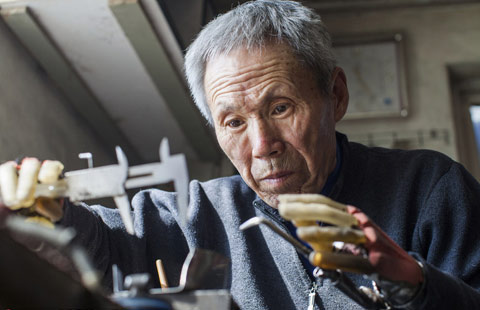

|
Groundbreaking for Samsung's new flash memory plant in Xi'an high-tech zone, the largest foreign investment ever made in western China. Liu Ke / for China Daily |
Shaanxi's capital becoming more competitive against peers Chengdu and Chongqing
For Zhao Hongzhuan, it was a dream come true in April, when consumer electronics giant Samsung Electronics Co chose Xi'an for its largest overseas investment project ever - a $7-billion chip factory in the city's high-tech zone.
In the days preceding the announcement, a mixed feeling of anxiety, pressure and excitement had gripped Zhao, the director of the administrative committee of the Xi'an High-Tech Industries Development Zone, which will house the project.
He said he felt unsure and was concerned that the largest foreign investment by value in western China would bypass Xi'an for other locations, such as Chongqing.
But what he was sure about were the benefits that the project would bring to the capital of Shaanxi province.
"Samsung has come, and so will other large multinationals," Zhao said.
According to an agreement between the city and the company, Samsung Electronics will build a factory in the Xi'an high-tech zone by the end of next year to produce the NAND flash chips it uses in smart phones and tablet computers .
"The project will not only reshape the semiconductor industry in Xi'an but also bring momentum to the city, which has set a goal of becoming an international metropolis by 2020," Zhao said.
In the glory days of ancient China, Xi'an was the capital of the Tang Dynasty (AD 618-907) and the biggest metropolis worldwide, with a population of nearly 1 million. But in modern China, the city's glory has often been overshadowed by coastal cities in East China and to some extent by its peers in the west.
Along with Chengdu, capital of Sichuan province, and the Chonqing municipality, Xi'an is one of the major economic centers in the western region. However, Xi'an is perceived as the least attractive destination among the three for large multinational companies. Both Chongqing and Chengdu have more than 200 Fortune 500 companies, whereas Xi'an has 80.
Changing fortunes
Zhao said the lack of mega projects has been the main reason Xi'an has lagged in economic growth as well as foreign investment.
"Huge projects attract a great number of satellite companies. The Samsung investment is testimony to other big names that Xi'an is the place to be," he said.
In 2011, Xi'an had a GDP of 386.4 billion yuan ($60.78 billion), while that of Chengdu was 685.5 billion yuan and Chongqing, 1 trillion yuan. In terms of foreign direct investment, Xi'an saw a 30 percent year-on-year increase to around $2 billion in 2011, while Chongqing's FDI hit a record of more than $10 billion in the same year.
To catch up with Xi'an's peers in the west, Zhao was determined to attract Samsung as soon as he heard in late March last year that the company had a plan to house a multibillion-dollar project in China. Zhao had heard from various sources that Samsung had started evaluating 11 cities in China.
Xi'an was not on Samsung's initial list of top choices, and it seemed like an unlikely candidate at first to Jonathan Story, emeritus professor of International Political Economy at INSEAD, one of the world's leading and largest graduate business schools.
Xi'an was absent from Story's investment guide, titled Winning China's Markets in 2010, which introduced dozens of promising business regions in China, including Chengdu and Chongqing, to European companies.
"It is difficult for a city to earn a good reputation, and a project like Samsung's can be an excellent start," he said.
Just like other cities in western China, Xi'an clearly has advantages in manufacturing, given the macroeconomic context of rising labor and other costs in coastal China.
Transport links
Though Xi'an has no river to move cargo across China, it is on the route of the Eurasian Land Bridge railway, which connects Lianyungang port in East China's Jiangsu province to distant Belgium.
The central and local governments have been working constantly to improve the infrastructure of the city. Shaanxi province built the most expressways in western China in 2011 and plans to spend 170 billion yuan to build more, which will further take advantage of Xi'an's strategic location.
Zhao, the representative of the development zone, said low costs and maturing infrastructure enable Xi'an to enter a new stage of growth that is further made possible by Samsung's investment. But putting Xi'an on Samsung's list was a challenge.
"It is tailor made for Xi'an because the city has had a solid foundation for the development of the electronic information industry, which is made up of more than 2,600 companies," said Zhao, adding that the advantages Xi'an has in this sector lie in its local talent.
In Xi'an, as many as 200,000 college students graduate every year. There are also around 40 colleges and universities equipped with courses in electronic information as well as 50 electronic information research institutes in the city.
According to Samsung's press statement, the steady stream of talented people generated by the city's large amount of university and research institutions was among the key reasons the company chose Xi'an over other cities.
Fu Hui, managing director of Intel Mobile Communications Technology, said "Xi'an is no doubt the incubator for IT talent in China, but it used to be difficult to retain them after they graduated".
He added that his company's top challenge five years ago was to prevent its employees from going to top-tier cities, such as Beijing and Shanghai.
"The situation has changed since 2008, when Xi'an's economy started to take off and more companies, such as Intel, came to the city, offering more choices to local professionals," he said, noting that large projects, such as Samsung's will attract more talent from coastal cities to return to Xi'an.
Dong Xiaotai, HR service manager of the Xi'an High-Tech Industries Development Zone, has been working with Samsung Electronics to hire people for the project. He said an increasing number of people are now interested in working in the city.
"We have decided to hire people from other cities for the Samsung project to prevent poaching of employees from other companies in Xi'an. The attractiveness of Xi'an and Samsung has been beyond my expectations," said Dong, adding that he is on his way to job markets in Suzhou, Dalian, Shenzhen and Chengdu to hire people.
It is expected that Samsung will hire a large number of local people, from managers to technicians, for this project. Official statistics from the Shaanxi government suggests that as many as 13,000 job openings will be created by the company's investment in Xi'an.
Satellite companies
The increasing attractiveness is not just for talent. Samsung's huge investment in Xi'an is also set to attract other satellite companies to the region.
Zhao said dozens of Samsung suppliers have contacted the zone and as many as 13 of them have confirmed plans to invest in the city.
"The US-based Air Products is one typical example. We invited them to invest in the zone last year, but they were reluctant to do so. But around 15 days after Samsung made its announcement, the US company came to us again with an investment plan," Zhao says.
Air Products, a worldwide supplier of industrial gases and performance materials, equipment and services, announced the grand opening of an engineering office in Zhao's zone in late April.
According to its official statement, the company "has already signed a number of new customers in the region". The company has been serving Samsung Electronics for more than 20 years.
Xi'an made it to Samsung's final list, along with Beijing and Chongqing, after a number of meetings between Shaanxi government officials and senior management of Samsung in December.
But Samsung did not reach its decision until mid-March, said an official surnamed Jun at the consulate general of the Republic of Korea in Xi'an.
"It was a very difficult decision for them to make," said Jun, who went back to Seoul in mid-March to visit Samsung's senior officials only to find that they were still weighing Xi'an's pros and cons.
Shifting gears
Their top concern about Xi'an is that the city lacks experience handling big projects from multinationals, he said.
The government's ability to manage a project of such scale is one concern. The lack of an international environment, such as international schools and international hospitals, is another, Jun says.
"There will be at least 1,000 Koreans moving to Xi'an with their families, who are not only from Samsung but also from its Korean suppliers," he says, adding the city, which has not had its "foreign invasion" yet, does not seem quite ready to embrace such a large expatriate community.
Before Samsung, the largest foreign investment Xi'an had received was worth $600 million, Zhao said.
"They did have concerns in March and wanted to talk to government officials again, so we set up a meeting with the governor and vice-governor of Shaanxi province for them the following day after receiving their requests," he said.
"Their great enthusiasm was so impressive that it triggered our final decision," said Kwon Oh-hyun, CEO of Samsung Electronics.
Zhao said that to advance Samsung's project, three offices at the provincial, municipal and the development zone levels have been set up.
Contact the writers at [email protected]
|
The 307 sq km Xi'an High-Tech Industries Development Zone is home to about 16,8000 enterprises. Photos Provided to China Daily |
(China Daily 09/25/2012 page6)













